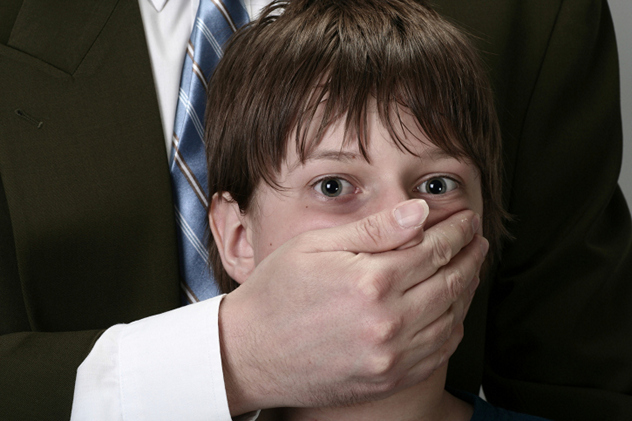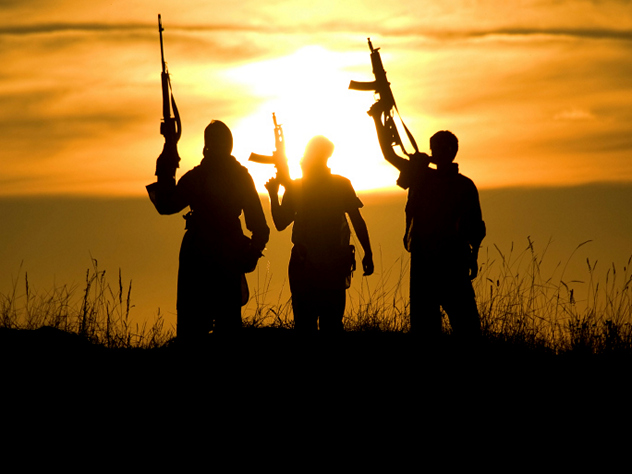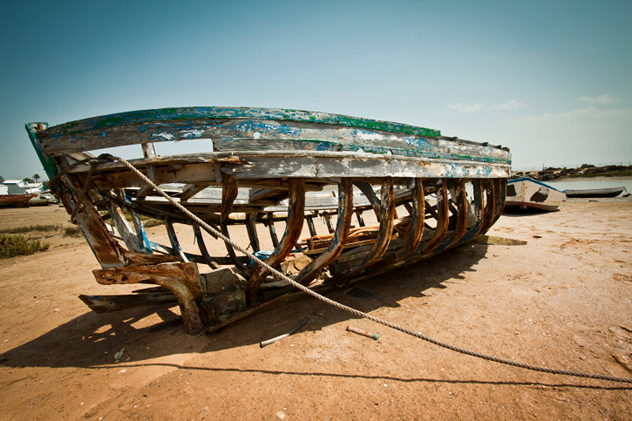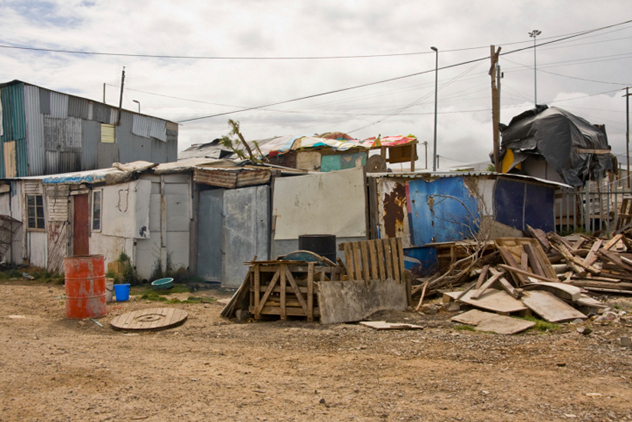 Weird Stuff
Weird Stuff  Weird Stuff
Weird Stuff  Weird Stuff
Weird Stuff The 10 Unluckiest Days from Around the World
 Food
Food 10 Modern Delicacies That Started as Poverty Rations
 Movies and TV
Movies and TV 10 Shared TV Universes You’ve Likely Forgotten About
 Weird Stuff
Weird Stuff 10 of History’s Greatest Pranks & Hoaxes
 Miscellaneous
Miscellaneous 10 LEGO Facts That Will Toy with Your Mind
 Misconceptions
Misconceptions 10 Widespread Historical Myths and the Texts That Started Them
 Crime
Crime 10 Incredible Big-Time Art Fraudsters
 Movies and TV
Movies and TV 10 Most Influential Fictional Objects in Cinema History
 Our World
Our World Top 10 Real Almost‑Cities That Never Materialized
 Weird Stuff
Weird Stuff Ten Bizarre Visions of 2026 from Fiction
 Weird Stuff
Weird Stuff The 10 Unluckiest Days from Around the World
 Food
Food 10 Modern Delicacies That Started as Poverty Rations
Who's Behind Listverse?

Jamie Frater
Head Editor
Jamie founded Listverse due to an insatiable desire to share fascinating, obscure, and bizarre facts. He has been a guest speaker on numerous national radio and television stations and is a five time published author.
More About Us Movies and TV
Movies and TV 10 Shared TV Universes You’ve Likely Forgotten About
 Weird Stuff
Weird Stuff 10 of History’s Greatest Pranks & Hoaxes
 Miscellaneous
Miscellaneous 10 LEGO Facts That Will Toy with Your Mind
 Misconceptions
Misconceptions 10 Widespread Historical Myths and the Texts That Started Them
 Crime
Crime 10 Incredible Big-Time Art Fraudsters
 Movies and TV
Movies and TV 10 Most Influential Fictional Objects in Cinema History
 Our World
Our World Top 10 Real Almost‑Cities That Never Materialized
10 Attempts At Charity That Stupidly Made Things Worse
If the road to hell is paved with good intentions, then the fast lane on the interstate must be built atop the burning husks of well-meaning charities. From misdirecting aid to kidnapping children to prolonging genocide—it turns out that there’s nothing more dangerous than an incompetent and unprepared charity trying to do good.
And while a penny sent to a professional agency like the Red Cross might be a penny well spent, sending a penny to any of these goons is probably worse than just throwing the coin into the ocean.
10New Zealand Offers Dog Food To Starving Kenyans

In 2006, two years of sustained drought brought Kenya to the brink of disaster. Crops failed, food shortages became fatally acute, and over 4 million people faced the very real possibility of starvation. In the face of this impending humanitarian crisis, New Zealand manufacturer Christine Drummond decided something needed to be done. And that “something” was to offer free dog food to starving Kenyans.
To be clear, this is just as offensive in Kenya as it would be anywhere else in the world. Even when starving to death, most of us would like to maintain a modicum of dignity—dignity and eating dog food are typically mutually exclusive. The Kenyan press tore Drummond to shreds. First, for her absurd offer. And second, for her determination to deliver her subsidized kibble to an area that was completely unaffected by drought—a move as absurd as responding to Hurricane Katrina by sending swim suits to Antarctica.
Although Drummond later denied that the paste was actually dog food—claiming it was simply based on a near-identical formula—the damage had been done. The press forgot all about the crisis and instead focused on “dog food woman,” much to the irritation of aid agencies actually trying to raise money and help.
9French Charity Kidnaps Children

For over a decade, the conflict in Darfur—a region in Sudan—has been one of the worst humanitarian crises happening anywhere on Earth. Thousands have been displaced and children are crammed into refugee camps, left to rot without parents or hope. Desperate to do some good, French charity Zoe’s Ark flew to a refugee camp in Chad with the plan of rounding up as many orphans as possible, and giving them to loving French parents. It was an idea with its heart firmly in the right place. Unfortunately, the reality was somewhat different.
For a start, the charity completely ignored Chad’s adoption laws—which make whisking children from refugee camps without any government oversight illegal. Even worse, those in charge apparently didn’t check whether the 103 children they took were really orphans. A subsequent Red Cross investigation revealed that 85 percent of them were neither from Darfur nor refugees, but had been stolen from their parents in Chad—a practice you may recognize as kidnapping.
As the icing on this gigantic cake of corruption, the charity was also discovered to have given the children fake injuries—presumably on the assumption that refugees can’t be proper refugees without a missing eye. For all their good intentions, the charity workers were arrested by authorities, and now stand accused of charges ranging from fraud to human trafficking.
8Children In Need Accidentally Funds Terrorism

Children in Need is one of Britain’s most respected charities. Run by the BBC, it regularly donates millions of pounds toward helping disabled children, young people, and psychopathic terrorists. Wait, what?
It’s true: between 1999 and 2002, the charity regularly passed donations on to Leeds Community School, which in turn used them to fund an Islamic bookshop. Unfortunately for the BBC, this bookshop just happened to be owned and operated by the 7/7 London suicide bombers. With the donations from Children in Need—along with those from other sources—the group funded the printing and distribution of terrorist and anti-Semitic literature, and scheduled local film screenings aimed at recruiting future jihadists.
Perhaps worst of all, they also took adventure trips—meaning heartfelt donations from kindly Brits literally paid for violent fundamentalists to go white water rafting. In the aftermath of the London bombings, the connection was discovered, and the BBC issued a full apology—but not before Children in Need became forever associated with vacationing terrorists.
7The UN’s Lethal Donation

In 2010, a devastating earthquake leveled Haiti, killing hundreds of thousands, and reducing entire towns to rubble. The aftermath saw an unprecedented relief effort, as aid agencies and UN troops descended on the country to help with reconstruction. Unfortunately, this required the UN redeploying service members from other parts of the world, specifically from Nepal. And these guys and girls arrived in Haiti with an accidental visitor in tow—cholera.
Prior to the UN’s arrival, cholera hadn’t been seen in Haiti for over 100 years. Following their arrival, it tore through the country, killing 8,000 people, and infecting over 100,000. As a prominent microbial geneticist remarked at the time, introducing the bug to earthquake-affected Haiti was “like throwing a lighted match into a gasoline-filled room.” Reconstruction efforts were hampered, innocent people killed, and a climate of paranoia fermented with incalculable consequences. In a sort of mass panic, treatment centers were swamped with protesters, and lifesaving anti-cholera drugs were prevented from reaching infected areas.
But worst of all was the UN’s response. Not only did the organization deny responsibility—a claim that flies in the face of all scientific evidence—they also refused to pay a penny in compensation. The result: Their so-called “peacekeeping mission” has deteriorated into the Haiti government trying to sue them in international court. Nice work, guys.
6The Humanitarian Circus

You probably remember the Indian Ocean tsunami. The day after Christmas, 2004, a mega earthquake triggered a cascade of water that engulfed several cities, drowned whole tracts of countryside, and killed over 230,000 people. In the immediate aftermath, a series of heart-wrenching images on TV triggered an unprecedented humanitarian response. Charities and NGOs flocked to the area to help with reconstruction. Only problem was: Nearly all of them were impossibly incompetent.
To start with, a huge number of charities on the scene simply didn’t know what they were doing. They just saw the TV appeals and turned up, with the result that rival aid agencies wound up fighting for space, instead of helping. Those that managed to get a foothold alternately ignored or completely undid the work of local community groups; with results best described as “stupid.” One group bought new boats for fishermen who’d lost theirs, apparently unaware that over a quarter of the boats they donated were completely unseaworthy. Another group tried to build new metal houses for people in Thailand, failing to realize that the blistering Thai heat made them impossible to inhabit.
The whole thing became a circus of stupidity and incompetence, stopping real aid agencies like the Red Cross from doing effective work—all so that some idiots could get an altruistic kick from their desire to “do good.”
5The Hospital Trust Blinded By Fame

Until a 2011 investigation turned the idea on its head, Stoke Mandeville Hospital Trust was considered one of the nicest charities on earth. Through their celebrity connections, the trust had raised phenomenal amounts of money to help treat children with severe spinal injuries. As a sort of “thank you” to those celebrities, the biggest donors were often allowed to visit the wards without supervision, and meet the children there. A nice enough idea, provided your top donor isn’t one of the most prolific sex offenders who ever lived.
In the 1970s, British TV presenter Jimmy Savile began volunteering at the trust. Unknown to anyone at the time, Savile was a serial sex abuser, who used his fame to cover up hundreds of assaults on children, and possibly acts of necrophilia. With a level of trust best described as “unfortunate,” the hospital gave him access to their wards; access he allegedly used to conduct a campaign of abuse against children as young as nine.
This would be horrific enough, but it’s also been suggested that the trust were aware of what was happening and did nothing to stop it—possibly out of fear of losing their biggest donor. Fast forward to 2013, and the trust has now been shut down—probably its first sensible move in the last four decades.
4Charities Accidentally Fund War Crimes

One of the paradoxes of delivering humanitarian aid is that you often have to work with the very same people who are perpetrating the horrific crimes you’re meant to be against. In Somalia, for example, charities require the help of militiamen to get supplies to ordinary citizens; resulting in a loss of about 20 percent of all aid sent to the country. For agencies on the ground, it’s a small price to pay for getting help to those who need it most. But, according to respected Dutch journalist Linda Polman, this sort of unintended distribution may actually be prolonging wars.
Take Darfur. For over a decade, a civil war has seen the military regime committing brutal massacres against innocent civilians. Aid agencies desperate to get in and help are forced to pay “taxes” to this regime on everything they do—leading to a situation where their money winds up paying for slaughter of the same people they’re trying to help. It’s a deadly catch-22, and the unintended consequences of it may be to perpetuate a disaster that would have otherwise fizzled out by now.
3Wyclef Jean’s Charity Breaks Promises And Starves Orphans

In terms of unbelievable corruption, a mediocre rapper is never going to scale the dizzying heights of, say, Suharto. But that sure hasn’t stopped Wyclef Jean from trying.
Remember the Haiti earthquake we spoke about earlier? Of course you do: it was one of the biggest disasters in history. Well, Wyclef’s now-defunct Yele Haiti charity managed to raise $16 million in donations on the back of that tragedy; almost all of which went toward funding Wyclef, instead of his former countrymen.
Aside from paying money to Wyclef’s family and non-existent companies, Yele repeatedly failed to deliver on contracted major construction and sanitation projects—including temporary homes and medical centers. As you may have already guessed, the remnants of a cholera-ravaged disaster zone are not the sort of place where you want the money for your vital medical centre to just vanish into thin air.
Where construction did get underway, it was often totally pointless. When the Global Orphan Project beat Yele to reconstructing a damaged orphanage, Yele promised to send food instead. After a few months, it abruptly halted the food supply, and started building a new and totally unnecessary orphanage. The building was never finished, and the children nearly starved. Speaking in the New York Times, the orphanage director later said: “If I had depended on Yele these kids would all be dead by now.”
So it’s official: Wyclef’s charity was so monumentally unhelpful, it nearly killed starving orphans.
1The Refugee Camps That Prolonged Genocide

The Rwanda genocide was one of the worst atrocities of the 1990s—an outpouring of hatred so intense, it cost the lives of up to one million people. As Hutu killers stalked the streets, looking for minority Tutsis, charities and NGOs rushed to set up refugee camps along the country’s borders. And then the unexpected happened. The tables turned, the genocide stopped, and it became the Hutus’ turn to flee . . . right into those same refugee camps.
This was an unmitigated disaster on almost every level. Thanks to the status of refugees, the displaced killers wound up getting food and treatment. Meanwhile, their victims lay dying across the border, surrounded by the corpses of their fellow Tutsis. To compound the trouble, agencies began recruiting camp managers from among the refugees—meaning former killers and war criminals wound up overseeing mixed-ethnicity camps.
And you better believe they took advantage. In an interview with the Guardian, journalist Linda Polman claimed the Hutus used the refugee camps as bases from which to continue their genocidal campaign—effectively using the aid and charity money to launch a second sustained campaign of slaughter. Had the charity world simply ignored the Rwanda genocide and not given a single penny, there would, perversely, be many more Tutsis alive today.
Final proof, if needed, that we all need to be way more careful about choosing who to send our money to.








